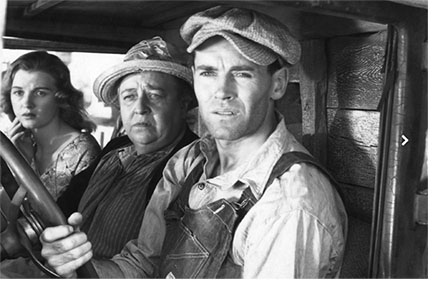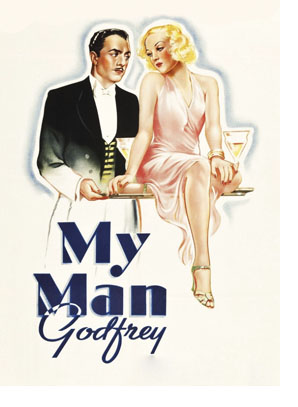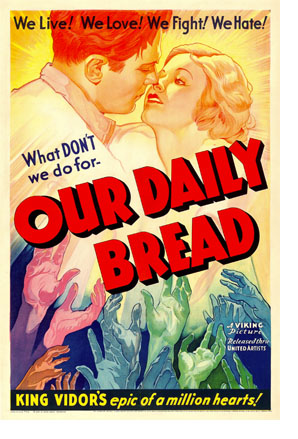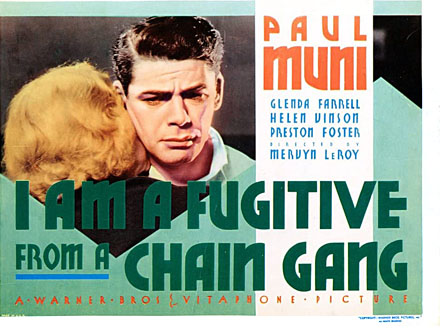A self-guided film series to accompany the Forgotten Stories exhibition
This film series has been curated by Robert Bibler

“Movies are our national theatre,” New Yorker critic Pauline Kael observed. Moreover, movies are a part of our collective unconscious and our shared narrative as a nation, especially the movies of the 1930s and 40s when millions of Americans went to the movies regularly, often every week. Since then, certain movies have endured, have become classics, because they distilled something of the mood and character of the times and offered audiences a way of seeing critical issues of the day. The challenge for filmmakers of the period was to take the terrible conditions of the Depression – unemployment, poverty, deprivation, inequality, and the collapse of the American Dream – and shape them into a cinematic vision, into a work of art. President Franklin Roosevelt used the expression “the forgotten man at the bottom of the economic pyramid” in a radio address in 1932. The phrase resonated with Americans, and it finds expression, explicitly or implicitly, in these four Hollywood films. Whether comedic or tragic, the movies in this series are a reflection of the suffering and the ideals of the decade during which they were made, the extraordinarily difficult years of the Great Depression.
Streaming options are suggested below each film description. Program notes are available for two of the films in our series, offering introductory comments and film history or interpretive commentary on the movie. See the link for each program note at the conclusion of the film descriptions below.
More about Robert Bibler

The Grapes of Wrath
John Ford, USA, 1940
129 minutes
“One of the great American films, an uncompromising adaptation of Steinbeck’s novel.” — Leonard Maltin’s Movie Guide
From catastrophic floods in the Mississippi valley to drought in the Dust Bowl, environmental calamities were a feature of the cruel Depression years, exacerbating poverty and farm failures and leading to masses of refugees. The Grapes of Wrath vividly depicts the plight of Dust Bowl farmers and the displaced Joad family’s journey west to the promised land of California. Director John Ford and cinematographer Gregg Toland studied the great Depression-era photographers (Walker Evans, Dorthea Lange, and Margaret Bourke-White) to achieve a miraculous balance between artful photography and an authentic visualization of an environmental and economic catastrophe. It’s a powerful adaptation of John Steinbeck’s 1939 parable of a fall from God’s grace, expulsion from the Garden, and the quest for a new Eden. Henry Fonda’s realization of Steinbeck's Tom Joad is a performance of such awesome spiritual intensity that it touches the soul, and John Carradine’s fallen preacher is unforgettable. Nominated for seven Academy Awards, The Grapes of Wrath is Ford’s most popular and acclaimed masterpiece. Ford and actress Jane Darwell (Ma Joad) won Oscars. A New York Film Critics Award went to Ford for Best Director. With Russell Simpson and John Qualen.
Streaming Options
Program Notes

My Man Godfrey
Gregory La Cava, USA, 1936
93 minutes
“Delightful romp with Lombard and crazy household… Classic screwball comedy.” —Leonard Maltin’s Movie Guide
“Top-notch screwball comedy defines the genre. Lombard is a stunner alongside the equally charming Powell.” — Videohound
A classic Depression-era comedy about wealth disparity in America that has lost none of its satirical relevancy, My Man Godfrey stars the incomparable Carole Lombard as a glamorous young socialite. Lombard is determined to win a high society scavenger hunt and, dressed in a glittering evening gown, she searches for “a forgotten man” in a Manhattan dumpsite occupied by homeless men. The acerbic tramp she locates there (William Powell) is not quite what she expected, yet he, Godfrey, is soon employed as a butler for Lombard’s rich, clueless, dysfunctional family. This is a gorgeous satire that offers lessons about decency and compassion.
Streaming Options
Program Notes

Our Daily Bread
King Vidor, USA, 1934
74 minutes
“‘Inspired by the Headlines of Today,’ this is a fascinating time capsule from the New Deal period, and a rare instance of an ‘independent’ American movie of the time.” — Time Out Film Guide
The economic desperation of the Depression years is perhaps more deeply felt in Our Daily Bread than any other 1930s film. A personal project financed with director King Vidor’s own money and forsaking major stars, Our Daily Bread is earnest, idealistic, and a bit naïve and awkward. Yet, it’s a landmark movie for its sincere feeling for its characters and its remarkable cinematic sophistication. Vidor follows a young couple’s effort to scratch out a living on a recently acquired bankrupt farm and their idealistic attempts, with other down-and-out folk, at collectivized farming. The joyous climax is a celebrated tour-de-force of film design and editing. With Karen Morley, Tom Keene, and John Qualen.
Streaming Options

I Am a Fugitive from a Chain Gang
Mervyn LeRoy, USA, 1932
93 minutes
“Still packs a wallop after all these years…Haunting finale is justly famous.” — Leonard Maltin’s Movie Guide
“Muni gives a brilliant performance…The film still packs a hefty punch.”
— Time Out Film Guide
As with the current Covid-19 pandemic, the Depression exacerbated and exposed pre-existing social problems and disparities of opportunity. Economic hardship fell unjustly and indiscriminately, and this story of wrongful conviction and unjust imprisonment hit home with audiences in 1932. Paul Muni stars as a veteran of WWI sinking into poverty when he becomes caught in the machinery of the criminal justice system. I Am a Fugitive from a Chain Gang raises concerns about misguided prosecution, penal “rehabilitation” and an unequal distribution of justice and leniency, issues that sadly remain with us today. As one of the most famous movies of the Depression years from the Hollywood studio that drew its screenplay ideas from the headlines, this excellent example of Warner Bros.’ penchant for realist, unflinching social criticism is based on a true story.
Streaming Options
© Robert Bibler
